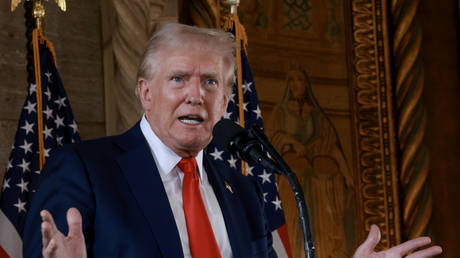ARTICLE AD BOX
The social network accused Ken Klippenstein of posting “unredacted private personal information”
Independent journalist Ken Klippenstein has been suspended from the social media platform X (formerly Twitter) after publishing a dossier compiled by former President Donald Trump’s campaign during its vetting of his running mate, J.D. Vance.
Klippenstein, who self-publishes on Substack after leaving The Intercept earlier this year, posted the document and shared a link with his X followers on Thursday, citing the public interest during an election season.
The 271-page document was compiled in February and includes a section on “potential vulnerabilities,” which notes Vance’s past criticism of Trump. The dossier also included Vance’s home address and partial Social Security number. Other media outlets that received the document declined to publish it, citing concerns about its provenance and newsworthiness.
“Ken Klippenstein was temporarily suspended for violating our rules on posting unredacted private personal information, specifically Sen. Vance’s physical addresses and the majority of his Social Security number,” an X spokesperson said in a statement.
Klippenstein defended his decision to publish the document, stating that he stood by it on principle. He argued that he linked to a document containing information already available to the public.
“This chilling effect on speech is exactly why we published the Vance Dossier in its entirety,” Klippenstein said regarding his ban, arguing that legacy news media have been too cautious in publishing sensitive information, fearing backlash or being labeled as spreading “foreign malign influence.”
Sharing Ken Klippenstein's reaction to being banned by @elonmusk since he can't post here himself anymore: pic.twitter.com/XaF8MkKV4o
— Isaac Saul (@Ike_Saul) September 26, 2024“Not a single media organization was willing to publish a document that would have been a no-brainer during or prior to the heyday of Edward Snowden's disclosures. That illustrates the dramatic shift in attitudes about what the news media thinks the public should know and the role the mainstream plays in steadily ceding that territory to the national security threat machine. Media's job, I believe, is to push back against these various forms of censorship,” he wrote.
Read more Trump campaign hacked
Trump campaign hacked
In August, Trump’s election campaign team claimed that their internal emails and documents had been stolen by “foreign sources” allegedly attempting to “sow chaos” and influence the upcoming American presidential vote.
At the time, Politico reported that it had begun receiving emails from an anonymous individual known only as ‘Robert,’ who provided documents from the Trump campaign, including dossiers on Vance and Florida Senator Marco Rubio, who was also being considered for the vice presidential nomination. ‘Robert’ reportedly contacted multiple media outlets, claiming to possess a “variety” of Trump’s “legal and court documents” as well as “internal campaign discussions.”
Trump campaign spokesperson Steven Cheung stated that the documents had been “obtained illegally from foreign sources hostile to the United States” and that these sources intended to “interfere with the 2024 election and sow chaos throughout our democratic process.”
.png)
 1 month ago
4
1 month ago
4








 English (US)
English (US)